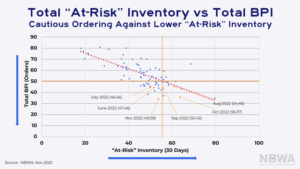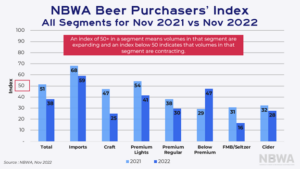Press Release
NBWA Releases November Beer Purchasers’ Index
Media contact: Erin Donar | EDonar@nbwa.org | 703-229-3702
ALEXANDRIA, Va. – The National Beer Wholesalers Association (NBWA) released the Beer Purchasers’ Index (BPI) for November 2022.
Heading into the final months of 2022, there is a pessimistic outlook throughout the industry. The November BPI shows a low reading of 38 and the “at-risk” inventory index is relatively higher at 49. This continuation of lower BPI readings and low “at-risk” inventory are indicative of lower expected sales following fall price increases, news of increasing layoffs and a general slowing of the U.S. economy.

About NBWA’s Beer Purchasers’ Index: BPI is the only forward-looking indicator for distributors to measure expected beer demand. The index surveys beer distributors’ purchases across different segments and compares them to previous years. A reading greater than 50 indicates the segment is expanding, while a reading below 50 indicates the segment is contracting.
Looking across the segments for November:
- The imports index continues to point to expanding volumes for this segment with a reading of 59 in November 2022. This is a lower reading relative to the November 2021 reading, which was 68.
- The craft index at 25 is well below the November 2021 reading of 47.
- The premium lights index posted a reading of 41 below the November 2021 reading of 54.
- The premium regular index at 30 is below the November 2021 reading of 38.
- The below premium index at 47 is significantly higher than the November 2021 reading of 29 and continues to be the only segment to report a higher reading over the 2021 indexes.
- The FMB/seltzer index continues to contract, falling to 16 in November 2022 from a November 2021 reading of 31.
- Finally, the cider index reports a November 2022 index of 28 compared to 32 in November 2021.

The National Beer Wholesalers Association (NBWA) represents America’s 3,000 independent beer distributors who service every state, congressional district and media market across the country. Licensed at the federal and state levels, beer distributors get bottles, cans, cases and kegs from a brewer or importer to stores, restaurants and other licensed retail accounts through a transparent and accountable regulatory system. Distributors build brands of all sizes – from familiar domestic beers to new startup labels and imports from around the world – and generate enormous consumer choice while supporting more than 140,000 quality jobs in their home communities. Beer distributors work locally to keep communities safe by sponsoring programs to promote responsible consumption, combat drunk driving and reduce underage drinking.